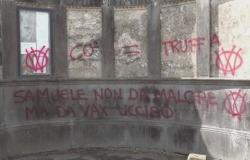
“April 25th is a day of celebration that must unite everyone. Anti-fascism, democracy, participatory and dignified work, pluralism of ideas, participation are indispensable values, at the basis of our Constitutional Charter and of the Republic. We must continue to transmit these principles to young people without divisions, in schools, in the workplace, in society, in the mass media”.
CISL leader Luigi Sbarra wrote this on social media on the occasion of the anniversary of Liberation Day.
Andrea Battistini, 25 April: between past, present and future
The Day of Liberation from Nazi-Fascism is an important anniversary to transmit to the new generations the memory of our contemporary history and keep alive our values, recognized and guaranteed by the constitutional charter: democracy, freedom, equality and solidarity.
Values that should never be taken for granted, particularly in a historical period like this characterized by new global challenges, wars, famines, violation of human rights, autocracies in many parts of the world, including in Europe.
Values that can be defended and guaranteed if, in addition to memory, we share, build and spread an idea and a perspective of a common future that can no longer be limited to national borders.
Therefore, we cannot talk about 25 April, if we want to make it current in its identity values, without talking about Europe and that project, that vision, which already in 1941 imagined the United States of Europe.
Authoritative and shareable are the calls from many quarters to strengthen and consider the European Union from a perspective that is not only geographical, but of common values, identity and future: from the President of the Republic Sergio Mattarella, to Mario Draghi, to Pope Francis who invites Europe to find itself and be itself.
The hope is that this day is not an opportunity to fuel further divisions, as has unfortunately already happened in the recent past, or exploitation, but an opportunity to rethink our future, taking advantage of our history.
A common future, not just a national one, which originates from a vision born in one of the darkest moments of our history.
Spinelli is the author, together with Ernesto Rossi, of the Ventotene Manifesto, drawn up in 1941 while they were in confinement as opponents of the fascist regime and considered one of the founding texts of the European Union.
Prof. Mario Albertini (I Quaderni di Ventotene – Institute of Federalist Studies «Altiero Spinelli» Ventotene, 1991) argued that “despite the increasingly unitary character of the historical process, which makes the world increasingly one, the entire political process is poorly guided by the political class and remains almost exclusively aimed at the changes to be introduced in one’s own nation, as if this were also enough to resolve large and dramatic problems of continental and global dimensions. Even peace in this perspective is conceived as an objective that can be achieved with a pure and simple sum of national policies.
Spinelli took the opposite side.
When, at the end of the Second World War, it was a question of choosing the orientation with which to prepare the future, the parties indicated the national path and chose the reconstruction of nations as their priority objective.
Spinelli, practically alone, indicated the European path and chose as a priority objective the construction of Europe, to be pursued not with foreign policy procedures, but with a democratic struggle of a supranational and constitutional nature.
He had fought fascism and had been in prison for this; he hadn’t come to terms with anyone, he was ready to fight alone, and he launched his challenge.”
The facts have made it possible to establish that overcoming national borders is a possible and necessary choice.
Prof. Albertini’s critical reflection on the limitations and resistance of national political classes to broaden their perspective and rediscover their identities and values in a supranational dimension, free from populism and opportunistic particularism, is unfortunately still relevant.
The Union does not question the foundations of national identity, as unfortunately is often represented by those with political responsibility, but rather protects it on condition that States do not infringe the principles underlying human rights and the balance of rights powers.
The push towards the European Union arose from the desire to avoid the horrors of the wars that had hit the world and Europe, especially in the first half of the twentieth century.
We must not, nor can we, forget it.
April 25th reminds us of this, history shows us the way.
A path we are following, albeit slowly and with difficulty.
Mahatma Gandhi said “Be the change you want to see in the world.”urging people to broaden their perspective towards objectives and possibilities for change that concern the community, promoting actions that favor the formation of a collective conscience.
Our future is in our hands.
Andrea Battistini
General secretary of First Cisl Lombardia




